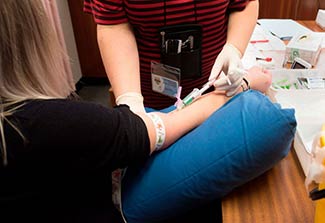Conducting research in a pandemic raises thorny bioethics issues
May / June 2020 | Volume 19, Number 3

Photo by Rodger Bosch/AFP via Getty Images
Scientists in South Africa and elsewhere are grappling with
ethical dilemmas as they begin clinical trials of therapies and
vaccines to combat COVID-19.
By Susan Scutti
Is it ethical to shelve studies of priority conditions to conduct COVID-related research instead? How do you ensure informed consent among trial participants who are extremely ill? Many low- and middle-income countries have been grappling with these issues. In South Africa, scientists have already developed a large portfolio of coronavirus pandemic research, including simple observational studies as well as multinational, multi-site clinical trials of vaccines and therapies. In all cases, research ethics committees need to quickly address thorny questions before granting permission to researchers, according to Dr. Douglas Wassenaar, a University of KwaZulu-Natal professor and longtime Fogarty bioethics grantee.
Informed consent remains an “ongoing debate” among research ethics committees (RECs) - his nation’s equivalent of institutional review boards, explained Wassenaar. “Most of us worry about the extent to which people comprehend what they’re consenting to.” Study protocols that compare a standard of care control arm versus a study intervention group also prove morally “tricky” because, currently, there is only palliative care for COVID-19.
“HIV has prepared us quite well to review complicated trials,” said Wassenaar. Some South African committees have been reviewing HIV research for the past 10 to 15 years and so are accustomed to “applications where the standard of care or prevention arm is quite complicated with a whole armamentarium of biomedical, social and behavioral things that should be considered. Placebo alone is clearly long gone in most HIV treatment and prevention research, and is probably not going to be acceptable in COVID research,” he said.
South Africa’s research ethics community responded quickly to the global crisis and began preparing for a possible surge in urgent research. When the virus first crossed distant borders, Wassenaar and a handful of colleagues spontaneously formed an informal network to quickly share relevant COVID-19 information among research ethics committee members across the country.
Next, they reviewed existing national guidance, last revised in 2015, and found an enabling clause that anticipated the need for accelerated research during an emergency. A committee subgroup then developed procedures to facilitate rapid review of protocols. “It basically recommends full-committee review for a clinical trial or research that is more than minimal risk, but we also encourage RECs to find faster ways of reviewing and prioritizing studies in the national and global interest,” said Wassenaar. There must also be careful targeting of stakeholders and opinion leaders, he said, so that everyone is satisfied there has been sufficient engagement with affected populations.
Finally, the COVID committee endorsed an informal peer-support system to empower individual REC chairs to confidentially share a protocol and receive comments from other committees within 24 hours. This ad hoc network means each REC is not solely reliant on its own experts. “We’re enriching the review process to make sure urgency doesn’t compromise quality and rigor,” said Wassenaar.
These new measures seem to have enabled some researchers to receive full ethics approval of pandemic-related studies within 10 to 20 days. Importantly, South Africa’s drug regulator almost simultaneously issued assurance to swiftly review COVID-related clinical trials, Wassenaar noted.
The crisis has spurred some positive changes, he said. The bioethicists held their first virtual meeting in April, which worked well and had a higher-than-normal attendance. “We are also going to learn a lot from this pandemic about improving efficiency of practice, getting much quicker decisions and using technology more wisely,” Wassenaar added.
He said he and his research partners have begun to consider pandemic-related changes to their Fogarty bioethics research training program. “We’re going to do some retooling to look at lessons learned from COVID and make sure our graduates and leaders on the continent are in a position to give good advice on how to respond appropriately in an emergency situation.” An ethics committee is always both “the good guy and the bad guy,” he suggested. Researchers think committees are too bureaucratic, while committee members believe they’re protecting the public. “But if you are too slow and inappropriately difficult - and you delay products getting into the public health system - then you are not on the side of the public,” said Wassenaar. “Through our program, we want to train people who consider this middle ground very seriously and can make the best possible decisions in difficult circumstances.”
More Information
To view Adobe PDF files,
download current, free accessible plug-ins from Adobe's website.
Related Fogarty Programs